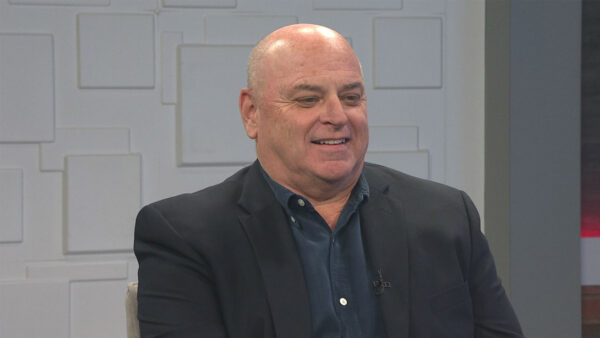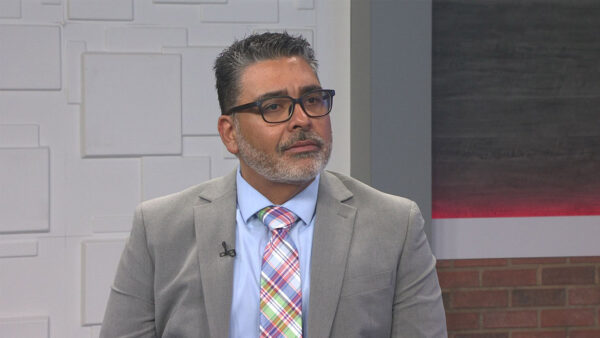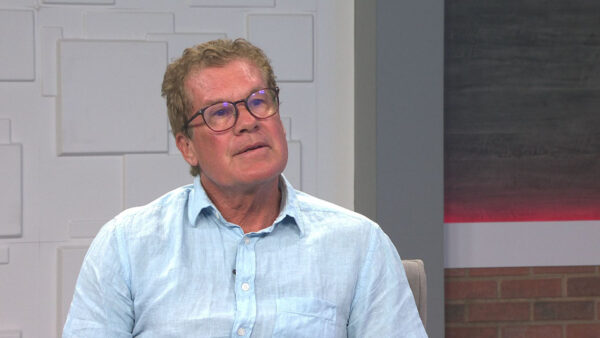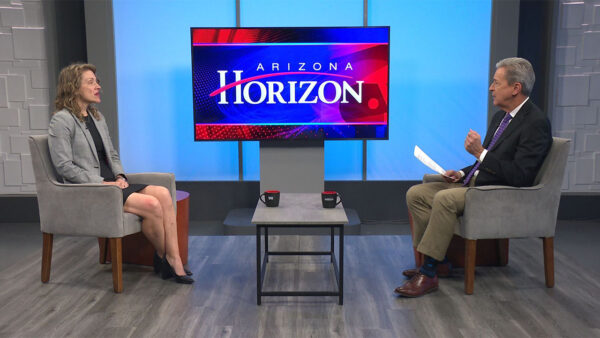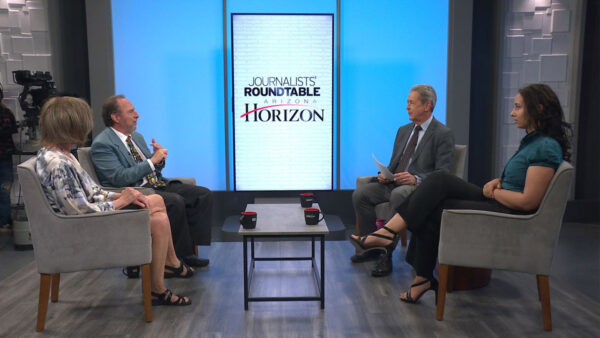This week the State Health Department held a lottery for applicants wanting to open a medical marijuana dispensary in Arizona. 97 of 433 applicants were awarded dispensary registration certificates, but it’s unclear if they’ll ever get to open for business. Attorney General Tom Horne has issued an opinion that the State’s medical marijuana law is preempted by federal law. Hear from Horne and Andrew Myers who managed Arizona’s Prop 203 (medical marijuana initiative) campaign.
Ted Simons: Good evening, and welcome to "Arizona Horizon." I'm Ted Simons. The demand to operate a medical marijuana dispensary in Arizona is greater than the supply of available licenses.
Arbitrator: No. 18, application 127. No. 5, 5 applications, there will be a draw.
Ted Simons: And that was the scene yesterday at the state health department as they conducted a lottery for applicants wanting to operate a medical marijuana dispensary. Arizona was divided into 126 community health analysis areas with only one dispensary allowed in each area. Some areas had no applicants, others had several. At the end of the day the health department issued dispensary registration certificates to only 97 of 433 applicants. But even the winners might not be allowed to open a dispensary. That's because state Attorney General Tom Horne has issued an opinion that Arizona's medical marijuana program is preempted by federal drug laws. The attorney general believes the courts should and will put a stop to the program. Here to talk about his legal opinion is Arizona Attorney General Tom Horne. Also joining us is Andrew Myers, campaign manager for Prop 203, the voter initiative that created the state's medical marijuana law. Good to have you both here, thanks for joining us.
Tom Horne: Good to be here.
Andrew Meyers: Thank you.
Ted Simons: The dispensaries are illegal. Why?
Tom Horne: Because the state law authorizes the sale of marijuana and federal law prohibits the sale of marijuana. And the relevant cases say that state law cannot authorize something which the federal government prohibits. The cards by contrast don't authorize anything, they simply identify people who are exempt from state criminalization. States can decriminalize marijuana. So the cards are not illegal. But anything that authorizes the growing or the sale of marijuana is preempted by federal law under the two most recent applicable cases, two out of Oregon and one out of California.
Ted Simons: Real quickly, I want to get back to the cards in a second. If illegal, why allow this dispensary operation that happened yesterday?
Tom Horne: This will not authorize the operation. There's an operating certificate that comes later. This is a registration certificate that comes out of the lottery. There's more that needs to happen. And then comes the operating certificate. I have advised the dispensary operators chosen to avoid investing more money until they see what the court says. If the court disagrees with me, obviously I don't want to delay the process. But while the Court is asked to rule on an accelerated basis, I'm advising dispensary operators to hold off on investing any money into it.
Ted Simons: Selling marijuana is against federal law, correct?
Andrew Meyers: The Controlled Substance Abuse Act has had the issue existing since 1996. The simplest answer to the question is if the federal government was interested in prohibiting states from being able to implement these programs, they would have sued a medical marijuana state and enjoined the implementation of the program long ago. Of the two cases the Attorney General refers to, one was out of 2008 in California, and one out of 2010 in Oregon. To my reading, those actually back up our view of events. This program can exist side by side with the federal program. There was a case called the County of San Diego versus San Diego Normal, and the conclusion held that the act of issuing a license for a medical marijuana dispensary or issuing a license for a medical marijuana patient didn't cause what's called a positive conflict with the Controlled Substances Act. The preamble to the Act itself says this law is not meant to occupy the entire space as it relates to the prosecution of controlled substances. But the state law, as long as it's not a positive conflict, is able to exist alongside of it. That's what has been the law since 1996 I don't see any reason why the federal government would change the view now.
Tom Horne: The San Diego case referred to is an older case, a 2008 case. I've got a 2011 case out of California. Actually the San Diego case is the case I used to justify saying it was okay to issue the cards. But I've brought with me copies of the cases. The 2011 case is called the Pack case. In that case, the court says the law which authorizes individuals to engage in conduct that federal acts forbids stands as an obstacle to the full objectives and purposes of Congress and is therefore preempted. Similarly in the Oregon case, the 2010 case, the Court said to the extent that the Oregon law firmly authorizes the use of medical marijuana, the federal leaves it without effect, preempts it leaving it, without effect. If our state authorizes growing and selling, that's preempted, federal law is superior to state law.
Ted Simons: Obstacle to the substance of the act. Sounds like both court cases mentioned this.
Andrew Meyers: They did. I think the issue here is we're talking about a medical marijuana law, and we've seen the federal government very reticent to engage in calling medical marijuana laws as being preempted by federal law. We have a case -- the most high profile case was Gonzalez V. Raich. They went a very long way in asserting the federal government's right to prosecute medical marijuana patients under federal law, under a commerce clause provision. However, I think very importantly they did not make any mention whatsoever of preemption in that case. It would have been an excellent opportunity for them to extend that. They had an opportunity to say it, they did not in that case. The State of Arizona recently filed a suit asking the federal government to declare that the medical marijuana law was preempted by the CSA. The federal government declined to do that in that case, as well. This really is politics. Ever since the law has passed we've had this issue put before voters three times. 1996, 1998 and 2010. It's been passed all three times. We've seen that the implementation has been blocked along the way. What I would like to have seen is, if the State believes that voters do not stand behind this issue, they would have referred it to the ballot. They know they would not have won it, have they referred it. Politics is trying to stop --
Tom Horne: Let me just say. In 1996 the voters passed it. In 1997 the legislature undid it. I was opposed to the medical marijuana initiative and I led what the legislature did then. More important than my opposition was my belief that we should respect the will of the voters. Because I was on the Judiciary Committee, I headed the opposition to what the legislature did that year. Because, more important than my opposition to the medical marijuana law, was my belief that we should respect the will of the voters, because I was on the judiciary committee. I very much respect the will of the voters. But Article VI of the United States Constitution has very strong language. If federal law conflicts with state law, federal law takes precedence.
Ted Simons: With that in mind. We've heard a lot about preemption lately, especially with regard to 1070. They say, oh no, it only goes to a certain degree when it comes to states rights. Why is it applicable there but not applicable here?
Tom Horne: Preemption applies when federal law contradicts state law and doesn't apply when the two laws are consistent. In Senate Bill 1070, the Arizona laws were modeled after a federal law, and the federal government was underenforcing it. The two laws are directly contradictory. Federal law makes it illegal, state law authorizes the growing and sale of marijuana, which federal law makes illegal.
Ted Simons: Bottom line here. You mentioned side by side, working side by side.
Andrew Meyers: Sure.
Ted Simons: But can a state violate a federal law? Side by side or otherwise?
Andrew Meyers: I think it's important to remember that the Controlled Substances Act itself said that you can have state controlled substances laws that operate side by side with federal controlled substances laws. This has been happening for some time now. Colorado has a very large and robust state dispensary system, been operating completely in the view of federal officials. They have made no effort to shut down the program. No state employees have been prosecuted. Zero state employees have ever been prosecuted in the implementation of the medical marijuana program. I think what's more important here, is medical marijuana law has been passed. Patients have a protection. The situation being created is a dangerous one. The law was never designed for people cultivating their own marijuana. The regulatory structure isn't there for cultivating marijuana. It's there for state regulated dispensaries to be able to dispense medication. There was a killing in Surprise because there was an individual growing marijuana in his home. If the dispensary were implemented, that would have been an illegal act, for him to be growing within 25 miles of a dispensary. So we have a situation where the lack of implementation on this issue is actually putting people's lives at risk and creating a dangerous situation.
Tom Horne: The federal government has shut down 58 dispensaries in Colorado and 600 in California.
Ted Simons: But they haven't shut them all down.
Tom Horne: But they are on their way to doing that, 600 in California.
Andrew Meyers: Let me point out, the federal government maintains -- and I think they are absolutely correct -- in every single case the dispensary was operating in violation of state's laws. If we can create a situation that's a fully regulated system, the federal government has, through U.S. attorney statements and statements from the department itself.
Ted Simons: The last question, very quickly. Should a lottery winner, the folks we just saw winning on the lottery things yesterday, should they wait until the issues are worked out?
Andrew Meyers: I think that the more delays, I hope we have a speedy resolution to this issue. The more we wait, the worse off we are. An incomplete implementation of this program is far, far more dangerous than the full implementation of this program. Honestly, at the end of the day, it's a nontoxic substance, far safer than any prescription medications that would be prescribed in its stead. We don't see any increasing crime.
Tom Horne: You know I was very involved in education and I've seen a lot of kids' grades go down, lose their ambition because of marijuana. I think it's very bad for society. I think Will Humble is doing a very good job. And the case law is ultimately what we have to go by.
Ted Simons: We've got to stop right there, thank you both very much.
Tom Horne:Attorney General; Andrew Myers:Managed Arizona Prop 203;





